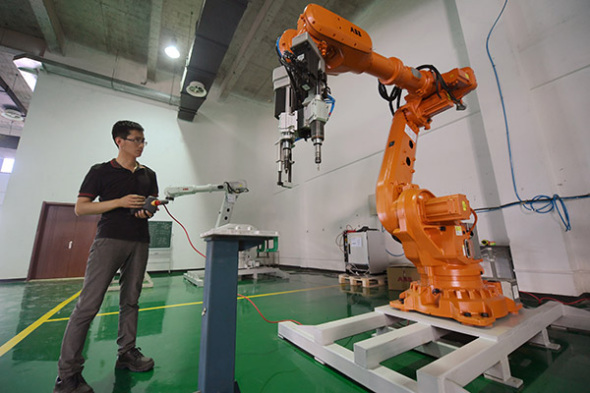
A startup entrepreneur tests a robot at an innovation center in Langfang, Hebei province. (Photo/Xinhua)
The regional development gap among Beijing, Tianjin and Hebei province is shrinking, a key report has disclosed.
In a far-reaching survey, more than 60 percent of the 1,200 people questioned felt integrated transports links, such as rail, road and air, had made significant progress since 2005-15, and brought the regions closer together.
Along with the survey, detailed government data are contained in the Index Report for the Beijing-Tianjin-Hebei Integrated Development, published by a think tank under the Chinese Academy of Social Sciences on Monday.
"This is the first substantial research into the integrated development of Beijing-Tianjin-Hebei," said Zhao Jianying, director of China Social Sciences Press, the publisher of the report. "This helps to assess its development status."
In 2014, President Xi Jinping proposed plans to integrate development between Beijing, Tianjin and Hebei province.
A year later, the Outline Plan of Beijing-Tianjin-Hebei Integrated Development was approved by the Political Bureau of the Central Committee of the Communist Party of China.
Part of the report shows the three regions have seen rapid development between 2005-15 in fields such as innovation and environment issues.
"The research is more scientific than other reports because we have combined statistics with a subjective questionnaire survey," said Huang Qunhui, director of the Institute of Industrial Economics under the Chinese Academy of Social Sciences, the think tank involved in the report.
Green development has increased between 2005-15 in the three regions, the report revealed.
But residents were still suffering from pollution, according to the survey.
About 59 percent of those polled believe air quality in the areas is not improving but deteriorating.
Up to 65 percent say pollution controls are not effective enough, the report showed.
More than 90 percent also believed that moving Beijing's manufacturing sector out of the capital was the correct decision.
Around 68 percent are also convinced Beijing's high-quality educational resources are lacking in Tianjin and Hebei.
In addition, State-owned central enterprises have struggled to keep up with integrated development plans in Beijing-Tianjin-Hebei, data highlighted.


















































